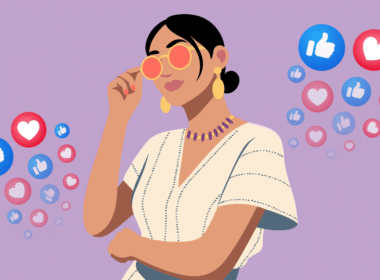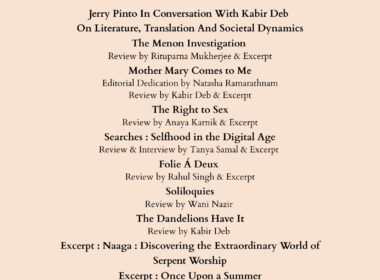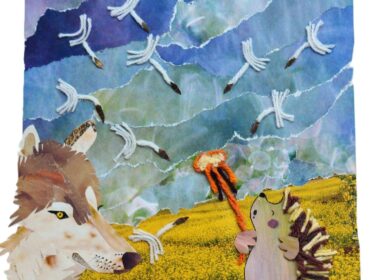In Conversation with Vauhini Vara
Tanya Samal : Vauhini, congratulations on Searches. It’s such a deeply introspective collection that examines language, loss, and the digital self. What compelled you to ideate and take on this experiment and to write something that feels so personal and so conceptually daring at the same time?
Vauhini Vara : I wanted to find a form that would let me enact what it’s like to live in a world in which understanding and communication is mediated by the products of big technology companies — and I realized that in order to do that, I would have to include the rhetoric of those products themselves.
TS : Searches seems to emerge from a desire to understand your relationship with language in an age when technologies and machines have increasingly begun to write for us. Having written it in collaboration, at times, with AI, did the process deepen your faith in human authorship, or did it make you more skeptical of what “authorship” even means?
VV : No, it didn’t emerge from this desire. I’m not actually interested in the question of whether technologies and machines can write for us — I was interested in how technology companies’ products, including AI products, allow these companies themselves to mediate our understanding of the world and ourselves and our communication about it.
TS : In the essay “Ghosts,” you collaborate with GPT-3 to write about your sister’s death. It’s one of the most hauntingly intimate pieces of writing about grief and loss and it was really interesting to see technology intertwined into something so personal. How did you negotiate the ethical and emotional boundaries of letting an algorithm into that kind of personal grief?
VV : I wouldn’t refer to my use of GPT-3 in “Ghosts” as collaboration; I actually wrote an essay about why I don’t think of it as collaboration. As I write in the book, I wanted to show through the essay how a big technology company’s product ultimately can’t communicate on a person’s behalf, as beautiful as the text it generates might be. In order to do that, I did have to share my writing with an OpenAI product. I think of that as a cost of doing the kind of work that I do, sort of the way in which scholars researching the biases and other shortcomings of AI products have to use the products in order to illuminate those biases and shortcomings.
TS : Much of Searches reads like a conversation between versions of yourself: the journalist, the sister, a witness to the digital age. Was the structuring of the book as a series of experiments your way of depicting this plurality of selfhood?
VV : It’s a valid and interesting reading!
TS : It is very hard to ignore that there’s a quiet but acute anxiety in the book about the vanishing of memory; both digital and human. Do you think technology and AI has made our emotional archives more fragile or does it present an opportunity for storing them as something more permanent?
VV : I don’t think either is true. Those archives are our own. What’s important to me is illuminating how technology companies’ products, even when they promise to fulfill our goals with respect to our emotional archives, are ultimately built to fulfill the companies’ goals.
TS : The “Notes on Process” section reveals that several translations and rewritings were mediated by AI. Did that partial surrender of authorship allow for a kind of honesty inaccessible otherwise, or did it make the writing feel more constructed, more filtered?
VV : There weren’t any rewritings in the book that were mediated by AI, except in the “Ghosts” chapter — which I set up in the previous chapter. There’s also a chapter in which my Spanish text is translated into English using AI, but that’s revealed in the text itself, just before that chapter. There is also a series of dialogues with ChatGPT in the book in which I pretend I’m asking for feedback for the book, but, of course, the reader realizes over the course of the book (and through the notes on process) that this is a performance; I’d already written the book and was not interested in ChatGPT’s feedback.
The goal was not a partial surrender of authorship; the goal was to deepen the reader’s understanding of the gap between my authorship and the material produced by tech companies’ products by showing my own writing alongside AI-generated material. I also wanted the reader to be able to see how the tech products are rhetorical tools of their owners — the tech companies — that are deployed to serve the owners’ goals.
TS : The book often blurs the distinction between essay and experiment, between memoir and mechanism. Do you see Searches as belonging to a new genre of writing that’s native to our digital moment, or as an extension of older traditions of the personal essay form?
VV : Both?
TS : In an age where women’s voices are still scrutinized for being ‘too emotional’ or ‘too intellectual,’ Searches occupies both spaces confidently. How conscious were you of writing against the preconceived gendered expectations of authority in tech and literature alike?
No, I wasn’t interested in deliberately writing against those expectations; I was interested in communicating on my own terms.
TS : At Usawa, we like to think about how women can claim agency in every space they occupy, digital or otherwise. If you could leave our readers with one piece of guidance for navigating the digital world creatively and responsibly, what would it be? How can they make technology serve their ideas, not the other way around?
VV : I think educating oneself about how these products function and whose goals they ultimately serve is an important first step.
Vauhini Vara has worked as a journalist and an editor for The New Yorker, The Atlantic, and the New York Times Magazine. Her fiction has been honored by the O. Henry Prize and the Rona JaffeFoundation. Her first novel, The Immortal King Rao, was a finalist for the Pulitzer Prize, and won the Atta Galatta–Bangalore Literature Festival Book Prize for fiction as well as the JK Paper–Times of India AutHER Award for best debut.




